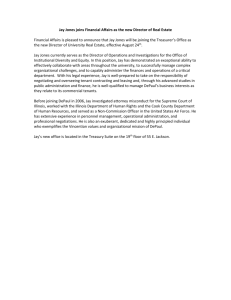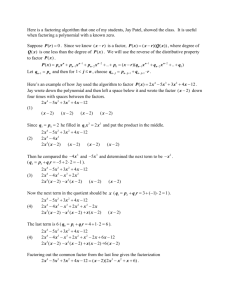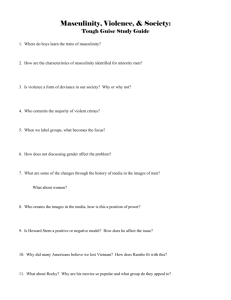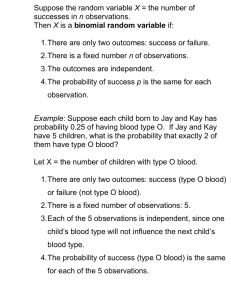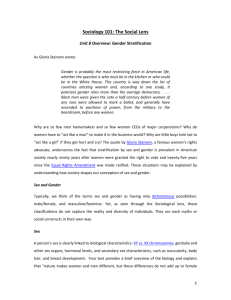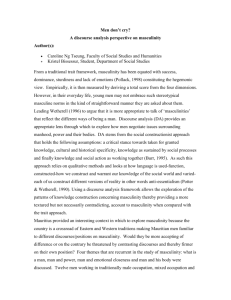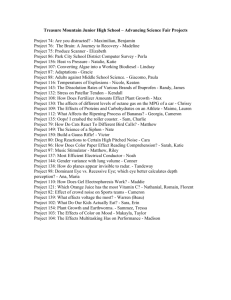Masculinity in Modern Family i Slipping into a new
advertisement
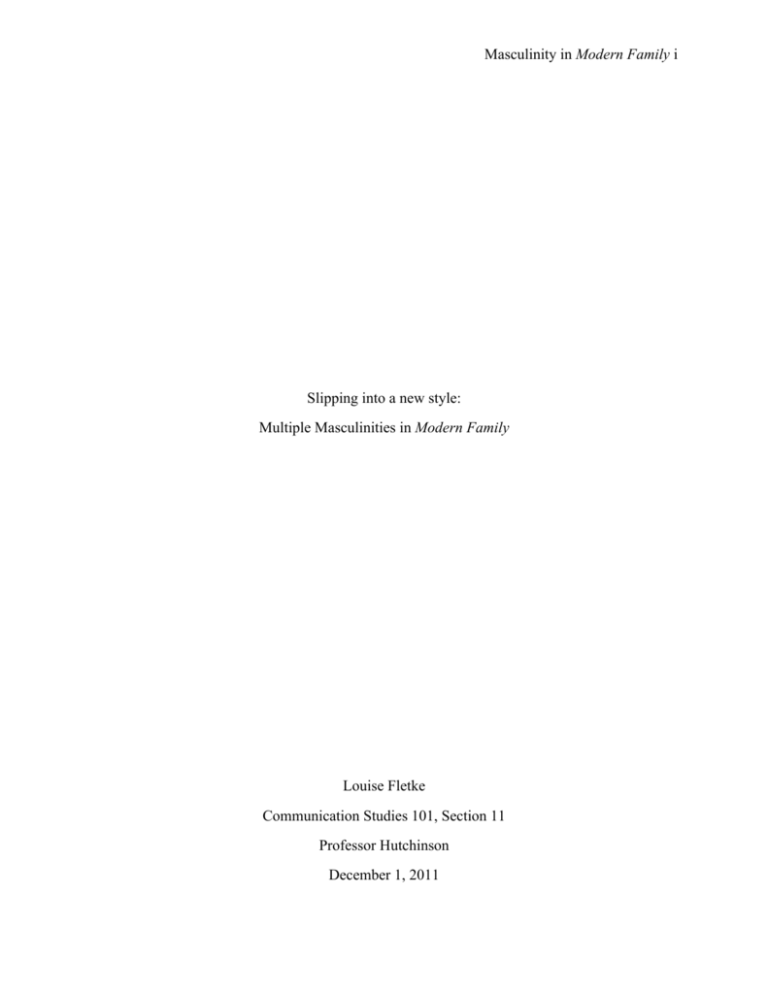
Masculinity in Modern Family i Slipping into a new style: Multiple Masculinities in Modern Family Louise Fletke Communication Studies 101, Section 11 Professor Hutchinson December 1, 2011 Masculinity in Modern Family 1 When encountering the term “masculinity,” immediate images containing men with fierce athleticism, outdoorsy auras, and stolid dispositions become the center of attention because they are “what culture expects of men,” (Hutchinson, 2011c). One company truly captures what it means to be masculine in their commercials- Wrangler jeans. NFL quarterback and Wrangler spokesperson, Brett Favre, exudes athleticism and ruggedness as he tosses the pigskin around with his buddies, not worrying if they get mud on their “tough jeans.” Favre presents a stolid attitude as he leans nonchalantly on the bed of his “built in America” pick-up truck while petting his golden retriever, checking off the animal of choice box with dogs, a real man’s pet, as stated by Professor Hutchinson (2011c). Absolutely nothing could be manlier. This commercial is the definition of hegemonic masculinity, or “the normative idea of male behavior,” (Hutchinson, 2011c) in action. However, it only represents a small portion of men in the real world. Many men of today, like the majority of the men in the television show, Modern Family, are getting away from the stereotypical manly Wrangler jeans, and are slipping into a more polished, designer jean or the like. Modern Family represents the idea that there are multiple masculinities, or “different versions of manhood available,” (Hutchinson, 2011c), that defy the ideal hegemonic masculinity, making it seem as if this hegemonic masculinity is outdated and not as prominent as it might have been at an earlier time. In Modern Family there is only one male character who embodies hegemonic masculinity in multiple ways. He is, coincidentally, the patriarch of the family as well, Jay Pritchett. One key component of hegemonic masculinity that Jay represents is strength, which directly correlates with athleticism. Although never stated outright, it can be implied that athletics are an essential part of Jay’s life as they are constantly mentioned throughout the show. After helping collect donations for the Rands, family friends whose house burnt down, Jay’s family asks him what he Masculinity in Modern Family 2 would save from a house fire. Jay answered that he would salvage his first set of golf clubs (Levitan, Lloyd, &Winer, 2011) shining a light on what Jay values the most in life from a material aspect, establishing the fact that Jay is a jock. He also uses sports metaphors; for example, in the Thanksgiving episode, when talking to his stepson, Manny, about a centerpiece he made for the dinner table, Jay says that it is “a swing and miss,” (Levitan, Lloyd, &Winer, 2011). Using a baseball metaphor reinforces the idea that Jay has an athletic mind set. Another quality of hegemonic masculinity that pertains to Jay is his ambitious and competitive attitude. Jay is the owner of a closet business that he began, therefore establishing the fact that he is an ambitious and goal setting individual. With ambition and competitive success comes arrogance, yet another trait of a “real man.” When talking about the Rands house fire with his wife, Gloria, Jay brags about his closet being the only standing structure left in the house (Levitan, Lloyd, &Winer, 2011). This is a direct product of his ambitious and competitive persona- it is inevitable that he will be pleased with himself and his success that was a product of his ambition, but it is also an inconsiderate comment that seems like something a real man who prides himself in competition would say. According to the Skate Life article, males that possess hegemonic masculinity value competiveness and emotional repression which can, at many times, be seen as insensitivity (Chivers Yokem, 2009, p.80). By not expressing emotions, real men are essentially exempt from intimate communication and displaying nurturing actions. Jay hits this on the head when his daughter Claire goes to vent to him about her problems and stresses. While she talks his ear off, Jay seems completely disinterested, as he sits watching football and drinking his beer. This quality represents that real men could not nor should not care about others problems, especially when there is a football game to be watched. Gloria even says that one sure-fire way to get Jay to Masculinity in Modern Family 3 stop doing something is to turn on a football game, making Jay seem like an insensitive and unemotional male with a one-track mind geared toward sports. Jay’s insensitive attitude is also exposed in other snide comments he makes. Jay’s son, Mitchell, is homosexual, which opens the floodgates of rude remarks from Jay. While Jay is moving boxes in the After the Fire episode, he throws his back out. Mitchell advises Jay to let his son in law, Phil, massage his back. Jay makes the cutting comment, “You might have a higher tolerance for a man’s hands on your body than I do,” (Levitan, Lloyd, &Winer, 2011). This statement reflects something that a real heterosexual man would say in order to condone the gay community or to suppress their own skeptical outlook on homosexuality. This scene also makes the case that men that represent hegemonic masculinity will always refuse help. Although Jay is in physical pain, he is stubborn to let Phil help him because he does not want to jeopardize his self-reliance, a key component of hegemonic masculinity according to Professor Hutchinson (2011c). The final hegemonic masculinity trait that Jay endorses is a possession of power over women. Jay is not only a dominant heterosexual male, but he is also married to Gloria, a gorgeous Colombian woman who is half of Jay’s age. This odd match up speaks volumes to Jay’s possession of sexual power over women when paired with his affluent finances because it seems unlikely that a couple like this actually has a loving relationship. The fact that Jay was able to marry a young and beautiful woman who is young enough to be his daughter shows that Jay is essentially a ladies man who sees what he wants and he gets it, again correlating with the hegemonic quality of ambition. Having Jay be the only male character on Modern Family to display truly hegemonic masculinity qualities exemplifies the recent push for acceptance of other masculinities. The fact Masculinity in Modern Family 4 that Jay is the patriarch of the family, and is the oldest of the bunch, symbolizes that his hegemonic attitude and actions are little outdated and are no longer the norm in the modern world. It is clear that he is outnumbered by the rest of the male characters in the show seeing as he is the only “real man” that possess the stereotypical hegemonic masculine traits. Therefore, it can be inferred that Modern Family is endorsing a shift from old age to new, and with that comes new ways to think about and view men and the masculinities they comprise. Jay’s son, Mitchell provides for a completely counter masculinity to Jay’s hegemonic tendencies. Mitchell, not only is a homosexual male, but he also is more of a “SNAG” or “sensitive new age guy” (Hutchinson, 2011c). The three main aspects of being a SNAG, as pointed out by Professor Hutchinson, are having feelings, being able to communicate, and being nurturing (2011c). Mitchell expresses all of these- he is always able to say what he feels, he is an avid conversationalist, and is a very nurturing father to his daughter, Lily, and also a caring partner to his boyfriend, Cameron. With the homosexual stereotype, Mitchell tends to pay more attention to his appearance making him more metrosexual. However, Mitchell still maintains a masculine physical attribute with his beard, allowing him to cling to at least one male stereotype of being a little rugged. Mitchell also posses some homosexual stereotypes in that his witty sarcasm is almost always is perceived as sass. Although he is sassy, he typically channels this into making fun of the homosexual stereotypes that he is effected by. For example, Mitchell is apologizing for being late to help move the boxes of donated items to the Rand family saying that Cameron was having troubles with his wardrobe. Cameron says, “It’s a somber occasion and all my tops are too joyful,” and Mitch replies with a sarcastic, “Trust me, you don’t want our problems,” (Levitan, Lloyd, &Winer, 2011). This comment makes fun of the stereotype of gays owning gaudy and loud colors and also that homosexuals tend to be overly dramatic. The real Masculinity in Modern Family 5 drama should have been focused toward the Rand family that lost everything, but Mitchell makes fun of Cameron for making it seem as if picking out a shirt is the real issue. Another homosexual stereotype that Mitchell represents is that gay men are the furthest thing from athletic. While Cameron tries to slingshot a pumpkin across a football field to prove his childhood story was true, Mitchell says, “The next one’s going through the goal thingy,” (Levitan, Lloyd, &Winer, 2011). The fact that he doesn’t know that the “goal thingy” is actually called a field goal post exhibits the idea that Mitchell holds no sporty or athletic knowledge, placing him on the exact opposite end of the masculine spectrum from his own father. Yet his encouraging words also lend themselves back to Mitchell being a SNAG in that he is being supportive and nurturing toward Cameron. Although Mitchell embodies a miniscule amount of masculine qualities, his partner, Cameron is in complete and utter opposition with hegemonic masculinity. In a sense, Cameron possesses many more feminine and homosexual characteristics than masculine traits. As stated earlier, Cameron is a stereotypical homosexual dresser because he wears loud colors and prints. More feminine qualities are expressed in his actions. When telling his childhood “Punkin Chunkin” story to a couple, Cameron flips on the feminine switch and gets completely engaged and enveloped in the story. He even went to the extent of invading the couple’s privacy ending his story telling session holding both of their hands with his face three inches from theirs. This seems feminine because women are more likely to be touchy-feely with their friends when gossiping or story telling- it is even an old stereotype of women to be overly emotional (Hutchinson, 2011b). Cameron also plays to feminine stereotypes in that he can be absolutely hysterical and dramatic. Cameron is deeply offended by Mitchell’s sarcastic comment in response to his Masculinity in Modern Family 6 “Punkin Chunkin” story and is seen whisking a bowl of batter ferociously. The fact that he is baking while he’s angry makes him seem like a 1950’s housewife, whose place was in the kitchen. Cameron is simply hysterical though, and as soon as he is flattered and complimented by Mitchell, his disposition instantly changes, showing how easily women are manipulated and how bipolar their attitude can be. As soon as Mitchell makes another rude comment (in Cameron’s eyes), Cameron dramatically sets down the bowl of batter and literally flees the room exuding extreme feminine hysterical qualities being superfluously emotional. Cameron is in constant conflict however. He is well aware that he represents both homosexual and feminine qualities, but he does not want to lose his masculine traits. Cameron always reminds the family that he is rough and tough because he was raised on a farm. In one instance, Jay won’t let Cameron pick up the truck that they are using to move the donated items; Cameron takes this as Jay stereotyping gays as unable to be manly and drive trucks. Cameron gets offended, again, and says that he is manly and “can do anything a straight man can do,” (Levitan, Lloyd, &Winer, 2011). After sufficient pestering, Jay finally allows Cameron to drive the truck, and Cameron replies with a girly “yay!” exhibiting that no matter how hard Cameron tries to be masculine, he will inevitably fall back into his homosexual and feminine tendencies. He counters this by speaking with a husky male voice when he’s driving the truck, yet he again slips back into his normal (stereotypical homosexual) voice when his nieces mock him. Finally, when Cameron was unable to back out of a tight parking spot, he refused help. Because men are supposed to be selfreliant, Cameron believed that he did not need help, trying to uphold another quality of hegemonic masculinity. He eventually caved in though, symbolizing that he also caved in to being a homosexual male with feminine qualities, who will more likely than not, never represent hegemonic masculinity. Masculinity in Modern Family 7 Another male character on Modern Family who is in constant conflict with hegemonic masculinity is Jay’s son in law, Phil Dunphy. Phil brings another masculinity to the table- the goofball. Phil is the epitome of a failure of a man who wants to achieve hegemonic masculinity. In the realm of athleticism, Phil was an athlete in college, except the team he was on was cheerleading, which in the eyes of real men is a joke. Phil is also incapable of being aggressive, an essential characteristic of hegemonic masculinity. Instead, Phil lives to make jokes, practically everything that comes out of his mouth is taken to be funny. While watching his wife, Claire, stuff the Thanksgiving turkey, Phil says things like, “Oh my goodness, those hands are cold,” and, “At least buy me dinner first,” (Levitan, Lloyd, &Winer, 2011) making him sound like an adolescent male just trying to get laughs. Another reason why Phil is unable to be aggressive is the fact that he is extremely emotional and makes a big deal out of everything, which is a direct effect of him being a SNAG. When Jay goes to Phil after throwing his back out, Phil is burning incense, playing ocean sounds, wearing a sleeveless shirt that displays his farmer’s tan, and has lit candles, taking a simple massage to the extreme. Phil is only trying to be nurturing, he just doesn’t know how to tone down his actions. Also by being a SNAG, Phil jeopardizes his already miniscule power over women. In his relationship with Claire, it is obvious that Claire wears the pants. It’s almost as if Claire has to babysit Phil because the potential for him to do something idiotic is infinitely large. In a confrontation that Phil has with Claire, Phil expresses his emotions saying that he “needs to be puffed up and frilly” and that Claire needs to stop “folding his dreams,” (Levitan, Lloyd, &Winer, 2011). Even when he is trying to make a serious and aggressive argument, Phil comes off as goofy, forever displacing him from the ideal hegemonic masculinity. Masculinity in Modern Family 8 Phil’s right hand man is his son, Luke, who presents another masculinity that varies from the normative hegemonic views. Luke is best described as the creative but also inattentive and disruptive boy. Always found joking around with Phil, or trying to avoid trouble, Luke embodies what it means to be a 10 year old male. Luke is by no means the sharpest tool in the shed, so he relies on Manny, Gloria’s son and his cousin, to be his mind and voice of reason. This being said, Luke and Manny are binary opposites, or the use of what something is to show what is its opposite (Hutchinson, 2011a). While Luke is the typical adventurous young boy, Manny (who is the same age) acts like an old man in every way. Manny is always dressed in slacks and a button down while Luke’s clothes are plastered with mud. Manny works on art projects and listens to classical music while Luke wreaks havoc in the Dunphy household. Whenever Luke and Manny spend time together it is clear to see that Luke plays Devil’s advocate while Manny maintains his perfect moral reason. An example of this happens in a conversation held between Luke and Manny while they pack up boxes for the Rands where Luke says, “That blows,” to which Manny replies with, “I know we’re all a little shaken up, but let’s watch the language,” (Levitan, Lloyd, &Winer, 2011). Luke also convinces a reluctant Manny to play with a toy helicopter that Gloria was giving to the Rand’s son. Both scenarios paint Manny as the proper ethical boy, who is too mature for his own good while Luke is a risk taker who simply revels in childhood, saying and doing things that are expected of him. Masculinity in Modern Family 9 References Chivers Yokem, E. (2009). Freedom on Four Wheels. Skate Life (pp.78-110). Ann Arbor, MI: University of Michigan Press Hutchinson, R. (2011a). Analyzing Media Texts 1: Semiotics. Communication Studies 101, Lecture. Hutchinson, R. (2011b). Media & Identity 1: Images of Women in the Media. Communication Studies 101, Lecture. Hutchinson, R. (2011c). Media & Identity 2: Men. Communication Studies 101, Lecture. Levitan, S., Lloyd, C. (Writers), Winer, J (Director). (2011). Punkin Chunkin [Television series episode]. In S Levitan, C Lloyd (Producers), Modern Family. California: 20th Century Fox Television. Levitan, S., Lloyd, C. (Writers), Winer, J (Director). (2011). After the Fire [Television series episode]. In S Levitan, C Lloyd (Producers), Modern Family. California: 20th Century Fox Television. Wrangler. (2008, September). [Commercial for Wrangler] <http://www.youtube.com/watch?v=J2pIvg-2vEY>
